| Reviews & Columns |
|
Reviews DVD TV on DVD Blu-ray 4K UHD International DVDs In Theaters Reviews by Studio Video Games Features Collector Series DVDs Easter Egg Database Interviews DVD Talk Radio Feature Articles Columns Anime Talk DVD Savant Horror DVDs The M.O.D. Squad Art House HD Talk Silent DVD
|
DVD Talk Forum |
|
|
| Resources |
|
DVD Price Search Customer Service #'s RCE Info Links |
|
Columns
|
|
|
Cheyenne: The Complete Seventh Season (Warner Archive Collection)
Cheyenne Bodie rides out...alone. Warner Bros.' Archive Collection line of hard-to-find cult and library titles has released Cheyenne: The Complete Seventh Season, a 4-disc, 13-episode collection of the venerable ABC oater's final 1962-1963 round-up. Shed of the cancelled Bronco, its final companion series, The Cheyenne Show reverted back to simply Cheyenne (although you wouldn't know it from the titles cards included on these transfers) and finally went solo this last half-season--to no-better ratings--before restless Clint Walker hung up his WB-issued six guns and left television for awhile for heftier paydays on the big screen. Viewing these polished but unremarkable episodes, as well as pleasant-but-clearly-disengaged man-mountain Walker, it's not surprising the once-mighty ratings winner was put out to pasture at this late date. No extras for these super-sharp black and white fullscreen transfers.
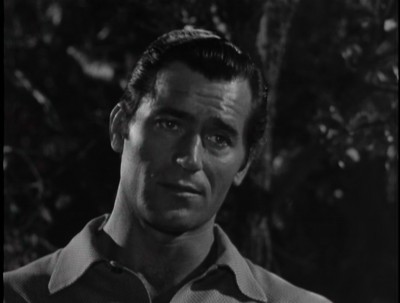
You don't get much more of a bare-boned set-up than Cheyenne's. 6' 6" jack-of-all-trades drifter Cheyenne Bodie (Clint Walker) travels from town to town, from job to job, encountering crafty, murderous cutthroats, venal cowards, wronged citizenry...and heaving, lusting women at seemingly every turn of the path. Orphaned as a boy by marauding Cheyenne Indians, Bodie was subsequently raised by the tribe, acquiring an acceptance of their ways and culture that few other White men share in the post-Civil War Old West. Working such diverse occupations as sheriff, freight hauler, cattle rancher, and U.S. Marshal, honest, kind, brave Cheyenne makes friends wherever he goes...but he never stays for long. He just keeps...drifting.
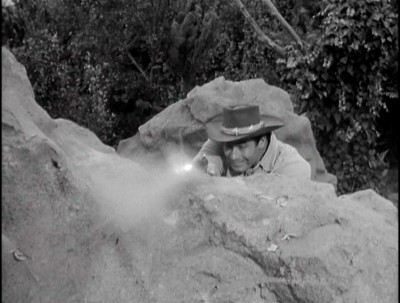
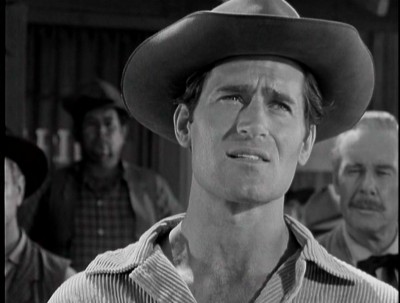
It's always a shame to see a long-running, once-popular TV show bow out with little fanfare or ratings interest, but I suspect that was the case with Cheyenne. Considering all the sturm und drang that surrounded this Western's troubled production, it's not surprising that the public finally had its fill of the series, as well as the accompanying contretemps, and eventually looked elsewhere for their Monday night TV relaxation (here's a hint: sitcoms were starting to give the horse operas a run for their money). I've written before about Cheyenne's complicated production and various incarnations, but briefly, in 1955, ABC, the smaller, struggling network of the "Big Three" in TV, approached Warner Bros. with a deal to buy their backlog of motion pictures that hadn't yet aired on TV. Having seen the success that Walt Disney had with his promotional Disneyland program, Warner Bros. suggested creating wholly original programming (based on past WB hit movies) within a rotating anthology format. Warner Bros. Presents premiered on ABC on September 13th, 1955; the three series were Kings Row, Casablanca, and Cheyenne, network television's first hour-long Western, starring newcomer Clint Walker. Cheyenne proved far more popular than Warner Bros. Presents' other two spokes of its anthology wheel, with the Cheyenne episodes garnering Nielsen Top Twenty ratings whenever it aired every third week or so. Warner Bros. dropped the Warner Bros. Presents framework for the 1956-1957 season, and alternated Cheyenne with a new, independent anthology show, Conflict; this was done because of Cheyenne's extended 7+ day shooting schedule. Conflict only lasted this second season of Cheyenne, creating yet another drag on Cheyenne's time slot's overall year-end ratings.
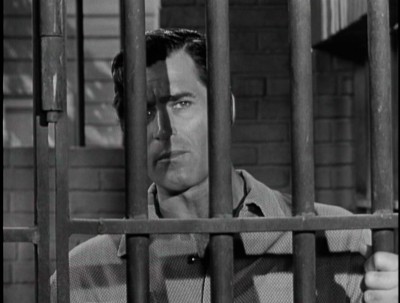
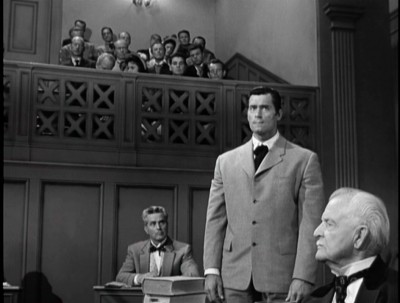
Enter Western Sugarfoot for the 1957-1958 season, which alternated with Cheyenne on the same Tuesday night 7:30pm time slot. A sizeable, complimentary hit, Sugarfoot placed on its own at 24th in the Nielsen's, while Cheyenne's ratings exploded, landing Walker's episodes as the 13th most-watched "series" of the year--a remarkable showing for two "split" series. Due to a penurious, restrictive contract with WB, exacerbated by the show's punishing schedule, Walker simply walked off the show at the end of the 1957-1958 season. Warner Bros., the first major Hollywood film studio to successfully launch original programming on its rival platform--television--wasn't about to give up this lucrative source of income. So, Cheyenne continued for the 1958-1959 season with a mix of repeats from Walker's first two season episodes, new Sugarfoot episodes, and new episodes of Cheyenne filmed with Ty Hardin, filling in as new wanderer, Bronco Layne. The result? The Sugarfoot episodes actually rose in the ratings, finishing off the year as the 21st most-popular "series" the year, while the Cheyenne Walker repeats and Ty Hardin "Bronco" episodes fell to a still-sizeable 18th for the year. Restricted from working anywhere else during this contract dispute, Walker took a compromise settlement from Warners (who realized quickly that Walker was the main draw of the series), and returned to Cheyenne for the 1959-1960 season, in a different time slot on Mondays at 7:30, where he alternated for the first half of the year, rather incongruously, with ABC's Shirley Temple's Storybook series of filmed fairy tales. Meanwhile, Hardin's character was given his own series called, aptly enough, Bronco, which alternated with Sugarfoot's third season in the old Tuesday 7:30pm Cheyenne slot. Warners was right about Walker's appeal: his "rebooted" Cheyenne show rose in the ratings as the 17th most-watched series of the year, while Bronco/Sugarfoot faded out of the Nielsen Top Thirty during the "Big Three's" Western glut.
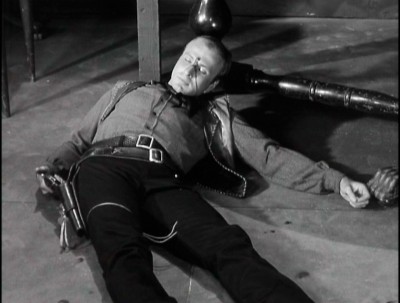
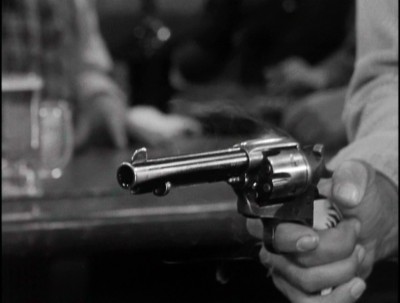
Hoping to bolster weakening Bronco and Sugarfoot, ABC and Warner's re-branded Cheyenne for the 1960-1961 season into The Cheyenne Show, pulling those two series in with Cheyenne to create yet another variation on the Warner Bros. Presents anthology. Ratings, however, still dipped (they should have just left Cheyenne on its own on Mondays), and the series came in at 28th for the year--indicative of the series' ratings' trend. For the 1961-1962 season of The Cheyenne Show, Warner's decided to cancel Sugarfoot, so only Cheyenne and Bronco episodes were filmed, with repeats of both strung through to fill out the schedule. However, this reconfiguration did nothing to stem the ratings slide, and The Cheyenne Show failed to make the Nielsen Top Thirty. Which brings us to Cheyenne's final half-season, where its last 13 episodes were aired on their own (Bronco having been cancelled) on Monday nights at 7:30pm. Cheyenne faced no competition from NBC's fizzled comedy/drama It's a Man's World; however, the first leg of CBS's powerhouse Monday line-up--comedy/panelist game shows To Tell the Truth (19th for the year) and I've Got a Secret (16th)--absolutely creamed Cheyenne, with nobody returning to ABC until 10pm's Ben Casey (tied for 7th), thanks to CBS' sitcoms The Lucy Show (4th), The Danny Thomas Show (7th), and The Andy Griffith Show (6th). Walker left regular weekly series television for eleven years, starring in such big screen vehicles as Send Me No Flowers (where his comedic skills were expertly utilized alongside Doris Day), None But the Brave, The Night of the Grizzly, Maya, and The Dirty Dozen, before he eventually drifted back into made-for-TV movies (Yuma, Scream of the Wolf, Killdozer!) the short-lived (and quite good) series, Kodiak and other one-off specials and movies (and at 86, he's still going strong, with frequent appearances on radio's Mark "The Great One" Levin Show).
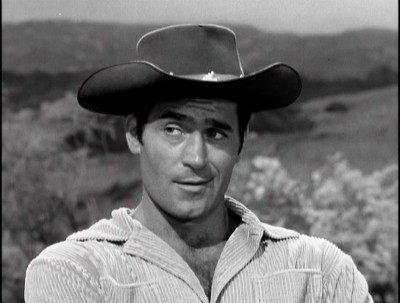
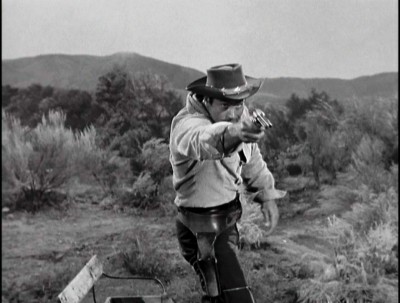
What's most unfortunate about this final round-up of Cheyenne is how ordinary and conventional most of it all plays; granted the previous season wasn't a stand-out, but I was hoping there would have been some kind of rallying point for this bow-out. As usual with these WB "boilerplate" oaters, the results are never less than polished and professional in execution, particularly with the studio's matchless production values--you can enjoy these last Cheyennes like any other good, undemanding pulp Western, guilt-free. However, there's no hiding the fact that much like the previous sixth season, the scripting has become increasingly rote and familiar, while Walker--a total pro, regardless of any publically-stated desire to leave the series--looks decidedly disinterested in it all. Whatever spark or drive Walker had that was leading him along in those first few seasons is now gone, ground out of him by the series' demanding production schedule, the lingering animosity with WB over their very public feud, the sameness of the stories presented to him here (and indeed, his unchanging--and unchallenging--Bodie character), and no doubt, also, the knowledge that the ratings were sinking fast and audiences were getting just as bored, too. In my second season review of Cheyenne, I watched multiple episodes that ranked right alongside any critically-acclaimed cult "B" Western from Boetticher or Peckinpah you could name. In this seventh season...I couldn't find one that hit those levels. Entertaining these seventh season oaters are, certainly. But memorable? Sadly...not so much. It was the right time to end Cheyenne.
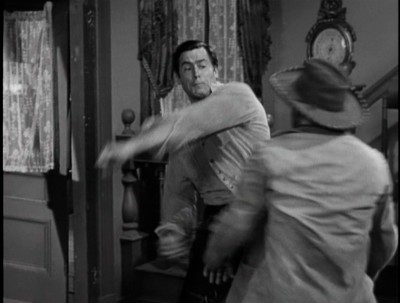
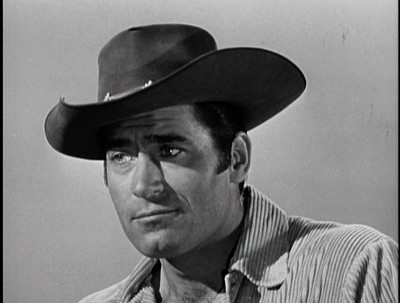
Frequent contributor Warren Douglas pens the season opener, The Durango Brothers, a slight-but-amusing take-off on Arsenic and Old Lace, with Walker frequently bemused at the antics of the murderous, moronic Durango brothers, including Mickey Simpson, Charlie Briggs, and Jack Elam (bugging his eyes like there's no tomorrow). Walker gets to whistle and sing in this one--quite nicely, too--along with a young Sally Kellerman. Scripters Wells Root and Ron Bishop come up with Satonka, a tense little actioner about a sacred Indian mountain and the "beast" that kills there, with Andrew Duggan tagging along, playing his usual kind of quiet, well-spoken authority-figure tough guy (this one plays quite like Walker's later classic big-screen outing, Night of the Grizzly). Sweet Sam is a promising entry from E.M. Parsons that fizzles out in the end; Robert McQueeney (silky and intriguingly weird) cons a whole town into believing he's a saint when he's really intent on stealing their gold (snappier, more expressive direction was needed for this interesting premise). Warner contract player Carl Reindel (Bullitt) does a nice job in the competent Man Alone, playing an outlaw with amnesia, helped along by Bodie (Lee Van Cleef, paying his dues, has a frustratingly tiny cameo here).
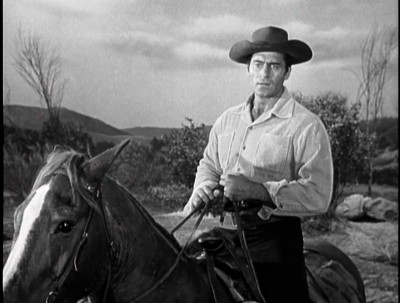
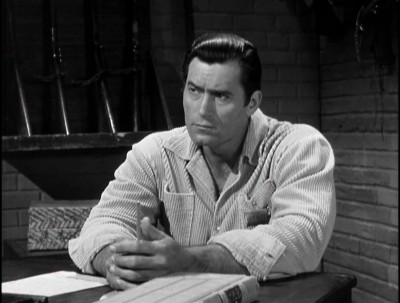
The Quick and the Deadly is a familiar frame-up job, with an excellent cast, including the always-welcome Jeanne Cooper, Ray Teal (he'll show up more this season), Frank Cady and Chris Alcaide (only James Anderson, as the framed deputy, overdoes it). Scripter James O'Hanlon comes up with a solid entry, Indian Gold, with Peter Breck making a good account of himself as a sheriff with ulterior motives when it comes to hidden Indian gold. As usual with Cheyenne, its stance towards its Indian characters is respectful and even-handed, an attitude typical of most TV Westerns at that time...despite what you might read from some modern historians with an agenda (also of note is a rather graphic killing of an Indian maiden shot in the back; one can see a marked increase in Cheyenne's on-screen violence as the season wears on). Scripter Peter Germano delivers up the thoroughly familiar but entertaining Dark Decision, featuring the marvelous Diane Brewster (who should have had her own series after her appearances on Maverick) as a blind singer who isn't interested in Bodie's wholesome church choir job (we all know what Brewster means when she sings, "I got a houseful of honey for the right honey bee,"). Peter Breck is back, too, doing good work as a slimy gambler. Chinese railroad workers make up the background of Pocketful of Stars (something not seen very often from this time period), a violent entry that finds Bodie winning a "pearl" in a lottery: that pearl being Lisa Lu. Lots of head-on carnage here, including Bodie shooting a guy between the eyes (bullet hole and all is on display), and the villains being blown to smithereens via TNT at the splashy fade-out. Warren Douglas scripted.
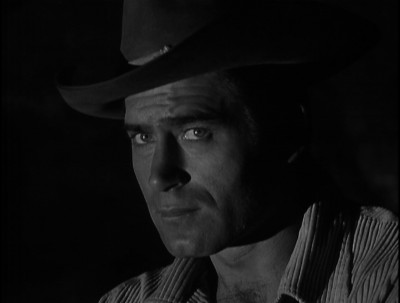
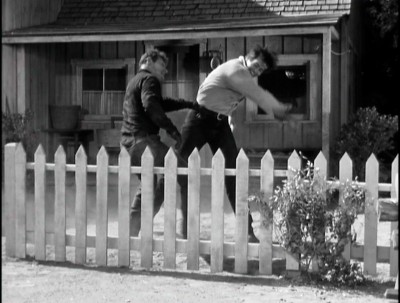
Scripters Warren Douglas and George F. Slavin come up with this half-season's best outing, The Vanishing Breed, a barely-Western that finds Bodie, much like Disney's Davy Crockett, going off to wage war not against the Indians, but corrupt, games-playing American politicians, when Bodie is named as a replacement State Senator. A great cast really puts over this bit of all-too-timely political intrigue, including Roy Roberts, Vaughn Taylor, Regis Toomey, and Harry Lauter (Walker, perhaps responding to the story's change-of-pace, puts in a sincere, engaged performance here). Vengeance is Mine, from Warren Douglas and Berne Giler, may not have one original idea in its head...but it does sport one of the best, longest fistfights I've seen from this period of TV, when Walker and uber-scary Leo Gordon duke it out in an epic ass-whompin'. Johnny Brassbuttons, from whom else, Warren Douglas, continues Cheyenne's track record of presenting positive Indian characters when calvary scout Tony Young is caught between his murderous, treacherous Indian brother Michael Pate, and inexperienced, inept calvary officr Yale Summers. Delightful, talented Ruta Lee has a showy role in Wanted for the Murder of Cheyenne Bodie, a rather obvious entry from Richard Collins that benefits not only from Lee's performance, but also from veteran Dick Foran's sleazy turn as a crooked sheriff. Finally, Showdown at Oxbend, from scripter Jack Usher, is a rather ignominious end to Cheyenne--somehow a piddling sheep/cattle range war doesn't seem fitting for this character's last outing--with Andrew Duggan doing the same performance he always does, while James Stacy hams it up something awful as a hot-headed young rancher (sexy Joan Caulfield is good, though, as a widow with a secret).
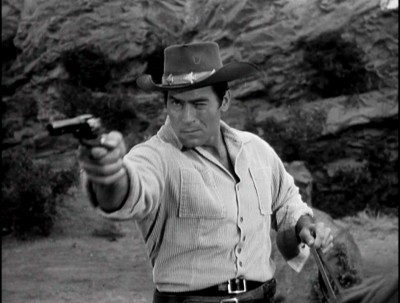
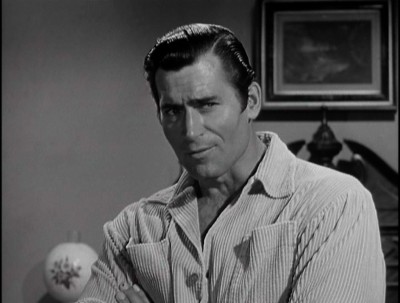
The DVD:
The Video:
Excellent. The fullscreen, 1.37:1 black and white transfers for Cheyenne: The Complete Seventh Season look quite sharp, with good gray scales, solid blacks, and on-the-mark contrast. Scratches and dirt are minimal.
The Audio:
That pesky too-low recording level in season six is gone now, with the Dolby Digital English mono audio track coming over clean and strong. No subtitles or closed-captions available.
The Extras:
No extras for Cheyenne: The Complete Seventh Season.
Final Thoughts:
Viya con dios, pardner. Clint Walker squares his 2 x 8 shoulders and directs his hoss to dump one last time on the Warner backlot in this final fade-out of the beleaguered Cheyenne (Walker looks as relieved as his horse). It was the right time to end it. I'm recommending Cheyenne: The Complete Seventh Season as good, solid, unpretentious--but awfully familiar by this point--oater fare.
Paul Mavis is an internationally published movie and television historian, a member of the Online Film Critics Society, and the author of The Espionage Filmography.


|
| Popular Reviews |
| Sponsored Links |
|
|
| Sponsored Links |
|
|
| Release List | Reviews | Shop | Newsletter | Forum | DVD Giveaways | Blu-Ray | Advertise |
|
Copyright 2024 DVDTalk.com All Rights Reserved. Legal Info, Privacy Policy, Terms of Use,
Manage Preferences,
Your Privacy Choices | |||||||














